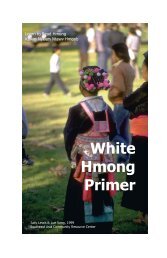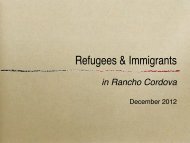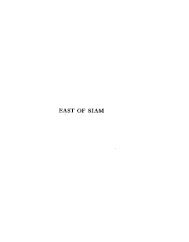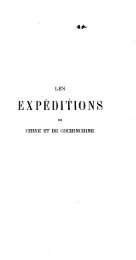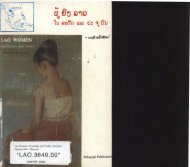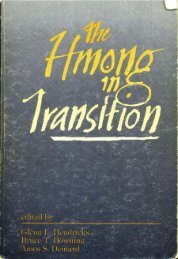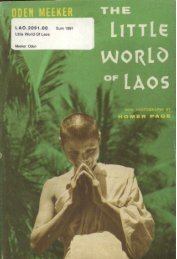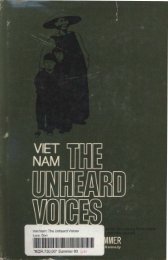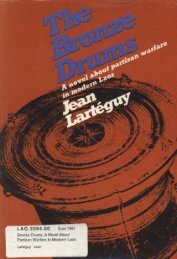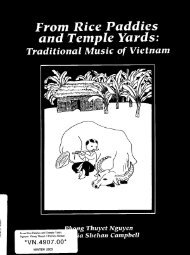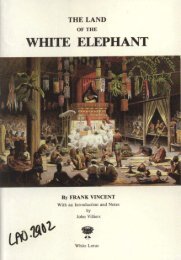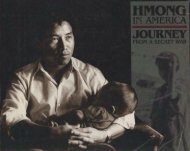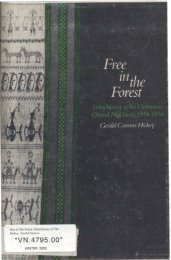PEOPLE
Grant, The Boat People - Refugee Educators' Network
Grant, The Boat People - Refugee Educators' Network
- No tags were found...
Create successful ePaper yourself
Turn your PDF publications into a flip-book with our unique Google optimized e-Paper software.
There was no wharf, so Lam Binh turned his boat across the harbour,<br />
following the shoreline for a couple of hours. Still no one<br />
noticed hem. He rounded a point and saw Stokes Hill wharf, the<br />
busy centre of rhe port of Danvin. He brought KG 4435 alongside<br />
about midday. Lam Binh then caught the attention of a fisherman<br />
working on 8 boat nearby. 'Where immigration people?' Lam Binh<br />
asked. 'We from south Viernm'. The fisherman told them to stay<br />
where they wm and drove ofi. As the wharf was crowded, Lam<br />
Binh anchored KG 4435 about fifty metres away. Immigration<br />
officials arrived in a pilot boat and stepped on bard. Lam Binh,<br />
taking a deep breath, made r speech he had rehearsed many times:<br />
'Welcome on my bat. My name is Lam Binh and hex are my<br />
friends from wuth Vietnam and we would like ptrmission to stay<br />
in Australia!<br />
These were the first of the boat people to travel through South-<br />
East Asia as far as Australia.<br />
On 30 April 1975, Saigon, the capital of the tmb~ttlcd Republic of<br />
Vietnam, fell to the Vietnam people's army,<br />
In the last weeks before the surrender the most envied pcople in<br />
the capital were to be found at the airport compound of Iht US<br />
define attachk's office, which was known as Dodge City. Here the<br />
Americans were proetssing those Vietnamese deemed compromised<br />
enough to warrant immediate evacuation to the United States.<br />
Ofiially, only the parents of Vietnamese girls who had married<br />
Americans and children born after 1958 were allowed on the flights.<br />
But the US immigration officers, sweating men in short-slcwed<br />
shirts who had been flown in specially for the job, had long since<br />
surrendered to the inevitability of the Vietnarntse,extended family.<br />
Grandparents, uncles, aunts, nephews, nieces and cousins of varying<br />
degrees squatted solemnly around the solitary American citizen who<br />
was their ticket out of Vietnam. At first glance, it might have been<br />
a crowd at a sporting event: the harassed officials calling out names<br />
over megaphones; American-Asian children in baseball caps and<br />
jeans playing around the suim~es; elderly women, in the peasants'<br />
straw has their daughtm so despised, staring at nothing. The sprawl<br />
continued to a bowling alley where people were sleeping on the<br />
Landfall<br />
plished law under a sign that said, among other things, chat prtlfaniry<br />
was airietly forbidden.<br />
At night, above the distant artillery fire, you could hear the drone<br />
of the American evacuation planes ming in and out of Tan Son<br />
Nhut airport. Long afm curfew, when the stmts were d&<br />
except for the bunging adolescents of the militia, the plmes' engines<br />
would wake you as they went into a steep dive for their final<br />
approach - a manoeuvre employed since repons wert received that<br />
the advancing North Victnamtsc were bringing surface-to-air missiles<br />
to Saigon.<br />
Delicately built Viemamest air force pilots, in basebdl cmp4 green<br />
fiying suits and with low-slung revolvers, stalkad about the crowd<br />
at the airport, studying faces as if they wert making an assessment<br />
of the sort of peoplc ahead of their families in the queue. It was common<br />
gossip that deals had been made with some Vittnamc&c officers<br />
in the hope that ensuring their own families a place on a plane would<br />
permade them to kaep their mcn under conuol. There had been<br />
instances of abandoned soldiery fuing on evacuation flights, hurling<br />
grenades at them, wen stowing away in the wheel wells and king<br />
crushed to death when the landing gear was rcoacted.<br />
And yet, only three weeks before Saigon fell, the head of the US<br />
information service in Vietnam appeared on government-6ponsored<br />
television to explain that the queues outside the American consulate<br />
downtown were merely 'American citizen5 and their dependants<br />
updating their records'. At the same time elements in the Central<br />
Intelligence Agency {CIA) wm putting out unverified auocity<br />
stories from the areas newly oempied by the North Vietnamese in<br />
the hope that a stubborn US congress might be persuaded to release<br />
the urns President Ford nnd Secretary of Stare Kisrringv wanted to<br />
wnd President Thiw. The Vietnamese did not find it difficult to<br />
hlitve these stories. During the 1968 Tet offensive the mmmuniutu<br />
had slaughtered 2000 pcople and buried them in mass grave in the<br />
cnclavc they held for a few days in Hue. Then the American and<br />
Vietnam- marines had defended that city so stoudy that some of<br />
the French press had called it the Vcrdun of Vietnam. Now, when<br />
it came to military metaphors, it was the final French defeat in Vietnam<br />
at Dien Bien Phu that came most readily to mind,<br />
It is difficult to pinpoint the moment when the general consensus




